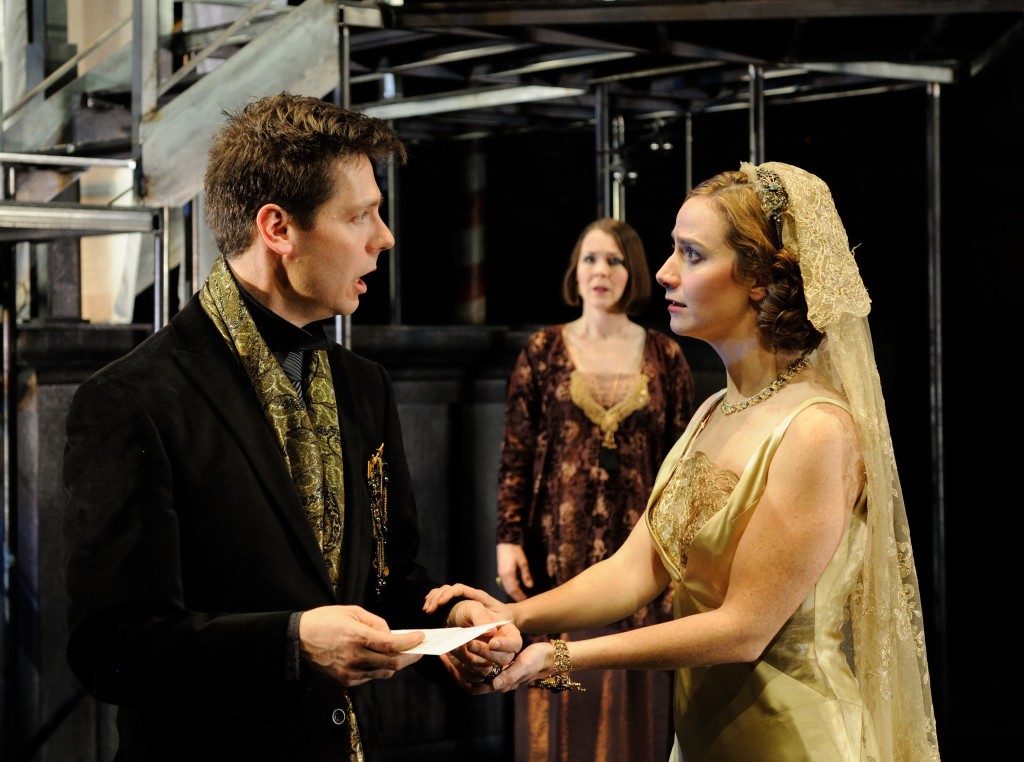
(L to R) Trinity Rep resident company members Stephen Thorne, Rachael Warren and Brown/Trinity Rep MFA actor Mary C. Davis in The Merchant of Venice at Trinity Rep. A bold new setting brings to light the timelessness of Shakespeare’s controversial play. Directed by Artistic Director Curt Columbus, the show runs through March 11 in the Chace Theater. Set Design by Eugene Lee, Costume Design by Olivera Gajic, Lighting Design by Keith Parham. Photo by: Mark Turek.
The Merchant of Venice by William Shakespeare, Trinity Repertory Company, 2/3/12-3/4/12, http://www.trinityrep.com/on_stage/current_season/TN.php.
Reviewed by Becca Kidwell
(Providence, RI) . The Merchant of Venice is one of Shakespeare’s most difficult plays but also one of his most satisfying. Shakespeare’s play examines the intricacies of love, loyalty, and ethics among the citizens of Venice. Trinity Rep’s current production provides a clear straightforward rendition of the tale.
No one in Renaissance England would have questioned the anti-Semitic tone of Merchant of Venice. By that time, the Jews had been driven out of Europe and were primarily living in the Middle East. Trinity’s production, set in the twenties, remains true to Shakespeare’s vision since Jews were being placed in ghettos in Europe by the 1930s. That said, Merchant of Venice is as anti-Semitic as Othello is racist. Curt Columbus, the director of this play, makes it clear in the program that Shylock’s story is one of faulty choices by a man and that Shylock’s religion has nothing to do with that decision. Bassanio (Stephen Thorne), a consummate playboy, gets his friend Antonio to borrow money from Shylock on his behalf so that he might woo Portia, the heiress in Belmont. While Bassanio definitely has an affinity for Portia, he states that his main reason for marriage is to pay off his debts. Stephen Thorne effectively plays the “Tom Cruise” like Bassanio with slickness and charm. His compatriate, Gratiano (Fred Sullivan, Jr.) helps keep him in a “frat boy” state of mind. The minor foolish characters of Darien Battle are funny, but two dimensional and don’t provide distinction between the different characters. Sullivan, Jr. also falls into this trap as one of Portia’s suitors.
Mary C. Davis commands attention as Shakespeare’s beloved heroine Portia. She displays a both a strength beyond her years, and a naiveté that allows her to be a completely objective judge during the trial. Rachel Warren deftly supports Davis as Nerissa. The two of them highlight the strength and feminity of their characters.
As Jessica, Caroline Kaplan, allows her character to grow from an impertinent teenager to a worldly woman who recognizes the repercussions of her actions not only upon herself but also upon her father.
Stephen Berenson plays one of the most gentle Shylocks that I have ever seen. This makes the scene where Jessica runs away more heartbreaking because he does not seem to have done anything to make her run away. His portrayal also makes his demands for justice more cruel since he appears reasonable and reasonable arguments are presented to him to be merciful.
Curt Columbus’ direction builds upon Shakespearean tradition with a mime of the play prior to the start of the play. He keeps a merry atmosphere among the darker subtext as the actors participate in revelry. The one action that seems out of place is when the two men kiss. While many commentaries speak of the potential homosexual relationship between Bassanio and Antonio, this production really doesn’t address it except for that one moment. This makes the kiss seem more like a statement for shock value rather than a statement of truth. Eugene Lee provides a spare yet solid representation of Venice through his set design.
While not perfect, Trinity Rep’s production provides a firm foundation to explore the story and themes of The Merchant of Venice. Davis’ performance as the intelligent, strong yet feminine Portia is worth any minor missteps.
Typed on iphone

caption corrected 2/23/12